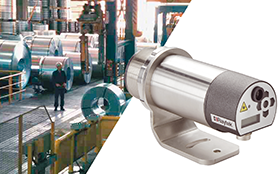

Accurate and reliable temperature measurement is a part of efficient metal processing and steel manufacturing. Incorrect temperature during the metallurgical process results in poor quality steel products, waste, extra energy consumption, increased refractory wear, surface defects and time lost due to inaccurate temperature monitoring and control.
The rugged and dependable noncontact infrared pyrometers of Raytek and Ircon are suitable for fixed installation in plants and machines and can be integrated into process monitoring systems via industry specific interfaces. They allow accurate temperature measurement of metal processing, even in the rough environmental conditions present during primary and secondary metal production, such as smoke, steam, dust or intermittent interferences, including scale or water.
A wide range of optics, including variable focus option on some models, covers an enormous variety of applications. This is supported by integrated through-the-lens sighting, plus either laser or video sighting for correct target location. With Raytek and Ircon sensors, factory operators can control the temperature of their process, resulting in significant energy and time savings, as well as increased safety, productivity and product quality.
Every step in steel manufacturing can benefit from IR thermometers
Sinter and coke plants: monitoring temperatures of iron ore, lime, coal and coke insures that the basic raw materials have achieved the right characteristics and prevents expensive conveyor belts from being damaged.
Blast furnace: thermal scans prevent overheating and premature damage to the refractory bricks.
Continuous casting: use of infrared thermometers to gauge cooling requirements of slabs, billets, or blooms, to ensure product uniformity throughout, and provide equipment operators with immediate temperature information vital to the cooling process.
Heat treating: ratio IR thermometers allow accurate temperature measurement of parts often obscured by smoke, steam or quench oil. Factory operators can selectively control temperature measurement of heat-treated parts, resulting in significant energy and time savings.
Tube/pipe mills: welded tube relies on accurate measurement of weld seam temperatures to insure 100% integrity of the seal and prevent bad or low quality tubing. Monitoring the billet temperature in pipe mills allows the operator to adjust rollers, which results in reduced process downtime.
Rolling mills: infrared temperature sensors accurately measure strip and sheet temperature so that rolling mill stands can be efficiently set to match the steel’s temperature. IR sensors can also be used to detect the presence of hot metal to accurately time roll stand operation.
Rod/wire mills: thermal scans of billet exit temperatures allow the operator to adjust rollers and reduce process downtime. Sensors mounted at the layering area control cooling of overlapping coils to improve product quality.
Forging: monitoring temperature reduces heating costs by preventing billet overheating and reduces machine and die maintenance by identifying under-heated billets before working.
Galvanising and annealing lines: during the production of galvanised or annealed steel, the metal is heated to critical temperatures to insure proper bonding of the galvanised coating, or annealing of the metal.
Metal coating: the paint applied to continuous coils of metal using rollers is then heated in oven. The temperature is critical to ensure proper bonding and colour. In the production of reinforcing bars for the construction industry, the bars are preheated and then the coating is applied and cured. Sheet temperatures can be monitored before and after coating to ensure the coating will bond and have the desired thickness.
Raytek and Ircon specialists provide training seminars and webinars on the basics of infrared thermometry, as well as installation, maintenance and tips on how to improve the steel manufacturing processes. A big part of their success is based on close cooperation with customers to develop instruments that solve even the most difficult applications.
R&C; Instrumentation is the sole southern Africa agent for Raytek, Ircon and Datapaq, now together as Fluke Process Instruments.
| Tel: | +27 11 608 1551 |
| Email: | [email protected] |
| www: | www.randci.co.za |
| Articles: | More information and articles about R&C Instrumentation |

© Technews Publishing (Pty) Ltd | All Rights Reserved